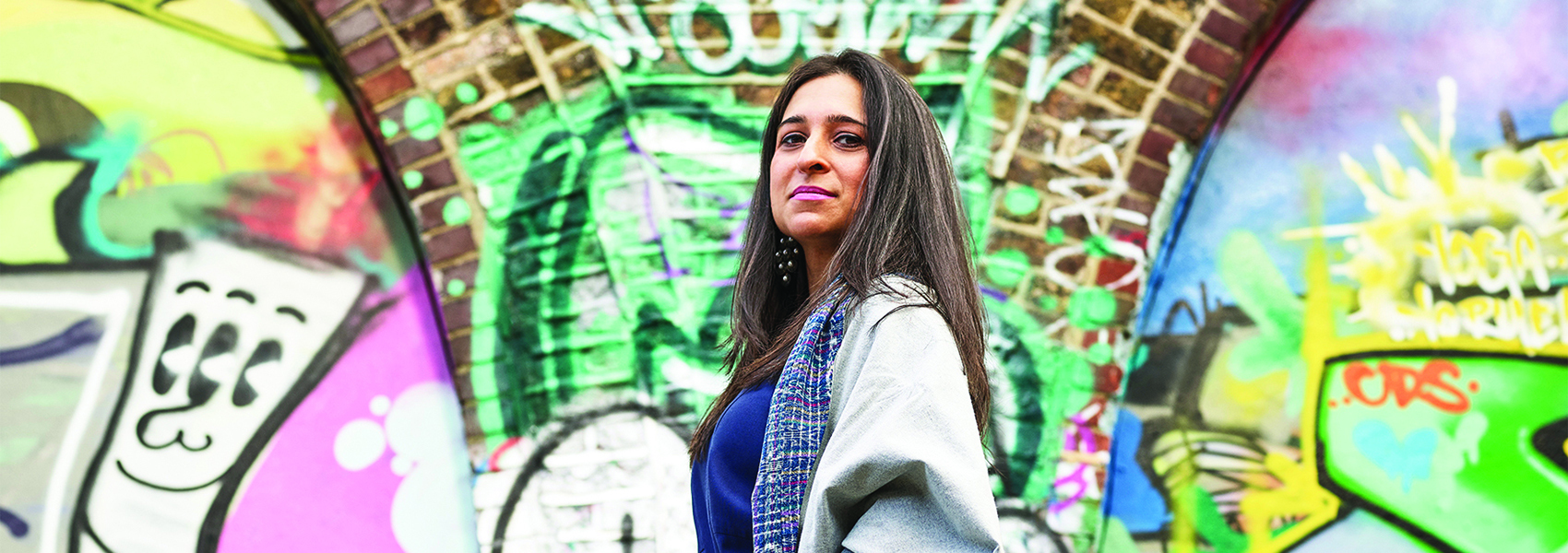



A passion for textiles born in the markets of Mumbai is helping one alum put the power back into the hands of the consumer.
Above credit: Marcus Lyon (Politics 1987)
Rupa Ganguli (MSc Textile Management 2001) understands the complexities of launching a lifestyle business in line with your values – especially when it comes to sustainability. The international trade specialist helps connect artisans within an industry that often values production over people. As she said: “It should always be about the people.”
Rupa traces her passion for textiles back to her teenage years. As a 17-year-old economics student “full of curiosity” she chanced upon a busy Mumbai wholesale market brimming with colourful fabric and “a lot of people who knew what they were doing”. She managed to persuade a seller to help her purchase some leftover fabric, and with it she made her own outfit.
Rupa’s ingenuity grew into a contemporary fashion business, first selling to her friends and then later to the wider community. Rupa doesn’t recall India’s retail sector being large at the time and her fledgling business caught the eye of the local press.
“I had to get a bank account, which was a big deal back then,” said Rupa. Her entrepreneurship helped secure a postgraduate degree at India’s premier school for fashion technology (NIFT, New Delhi) and she went on to gain a scholarship to study textiles at Leeds where she developed her interest in international trade. “It opened up a world of opportunity for me,” said Rupa. “I could spend hours and hours in the textiles library.”
Though her days in the Mumbai markets are behind her, she’s grateful that the experience propelled a two-decade career in business and trade. Rupa’s career spans working as a trade specialist within the United Nations’ International Trade Centre in Geneva and the World Trade Organization.
With her global connections she founded the Inclusive Trade platform for artisans who enable positive change. By demystifying the supply chain, Rupa helps consumers make ethical choices by leading them straight to the source. “It’s about transparency and visibility – people have lost that connection with the maker,” said Rupa.
Whether the products are fashion, accessories, homeware, jewellery or even chocolates, Inclusive Trade makes it easier to share the stories of creators all over the world. “What’s more, the majority of these wonderful products are made by women, or the process is led by women,” she said.
Alongside supporting artisans, Rupa is passionate about encouraging consumers to buy responsibly. “We often say that the fashion industry isn’t responsible enough, or that government regulations aren’t strong enough in terms of ethical standards, or that the big brands and retailers push prices down,” she said. “However, a lot of that could be solved if we as consumers started making choices that meant we actually live an ethical lifestyle. Making small and meaningful choices will go a long way.”
Words
L’Oréal Blackett (Broadcast Journalism 2010) is a freelance writer, presenter and former magazine editor from Manchester.
1) Price really is an indicator.
While not every £30 cotton T-shirt is sustainable, a £5 cotton T-shirt definitely isn’t. Everyone in the supply chain should make a living wage. This costs the consumer more in the long run but the price is fair.
2) Beware ‘designed in’ labels.
There is a difference between a label that says where a garment is designed (‘designed in’) and where it is actually manufactured (‘made in’). Not all manufacturers are transparent about how and where their items are made, and in Europe ‘made in’ labels are not mandatory.
3) Check for facts.
Just because it’s made in the UK or the EU doesn’t always mean it is ethical and safe. Look beyond marketing and check for facts.
4) Look for other certification.
Admittedly this is a minefield, yet look for certifications such as Global Organic Textile Standard (GOTS), OEKO-TEX, Global Recycle Standard (GRS) or Fairtrade.
5) If there’s no background information, don’t buy it.
There may be a reason why the manufacturer isn’t telling you about the source.
Enjoying the magazine?
Let us know what you think on twitter @leedsalumni